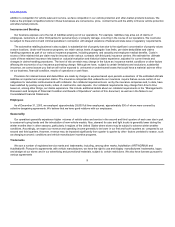AutoNation 2003 Annual Report Download - page 21
Download and view the complete annual report
Please find page 21 of the 2003 AutoNation annual report below. You can navigate through the pages in the report by either clicking on the pages listed below, or by using the keyword search tool below to find specific information within the annual report.
Table of Contents
tion for approximately $295.2 million of additional repurchases. Our revolving credit facilities and the indenture for our senior
unsecured notes contain restrictions on our ability to make share repurchases. See further discussion under the heading “Financial
Condition.”
• Accounting for Manufacturer Allowances: As of January 1, 2003, we adopted Emerging Issues Task Force (“EITF”) Issue No. 02-
16, “Accounting by a Customer (Including a Reseller) for Cash Consideration Received from a Vendor.” The adoption of EITF 02-16
resulted in a cumulative effect of accounting change totaling $14.6 million after-tax to reflect the deferral of certain allowances,
primarily floorplan assistance, into inventory cost. See further discussion under the heading “New Accounting Pronouncements.”
• Real Estate Impairment: In 2003, we recognized a $27.5 million pre-tax real estate impairment charge related to three
underperforming franchised new vehicle stores that currently operate in converted used vehicle megastores. See further discussion
under the heading “Other Losses (Gains).”
Critical Accounting Policies
We prepare our consolidated financial statements in conformity with accounting principles generally accepted in the United States of
America which require us to make estimates and assumptions that affect the reported amounts of assets and liabilities and disclosure of
contingent assets and liabilities at the date of the financial statements and the reported amounts of revenue and expenses during the
reporting period. Actual outcomes could differ from those estimates. Set forth below are the policies that we have identified as critical to our
business operations and the understanding of our results of operations or that involve significant estimates. For detailed discussion of other
significant accounting policies see Note 1, Summary of Significant Accounting Policies, of Notes to Consolidated Financial Statements.
Intangible and Long-Lived Assets — Our policies related to intangible assets determine the valuation of intangible and long-lived
assets, which is a significant component of our consolidated balance sheets. Additionally, these policies affect the amount of future
amortization and possible impairment charges we may incur. Intangible assets consist primarily of the cost of acquired businesses in excess
of the fair value of net assets acquired, using the purchase method of accounting.
Acquired intangible assets are separately recognized if the benefit of the intangible asset is obtained through contractual or other legal
rights, or if the intangible asset can be sold, transferred, licensed, rented, or exchanged, regardless of the acquirer’s intent to do so. Our
principal identifiable intangible assets are rights under franchise agreements with vehicle manufacturers. We generally expect our franchise
agreements to survive for the foreseeable future, and, when the agreements do not have indefinite terms, anticipate routine renewals of the
agreements without substantial cost. We believe that our franchise agreements will contribute to cash flows for the foreseeable future and
have indefinite lives.
Goodwill and intangibles with indefinite lives are tested for impairment annually at June 30 or more frequently when events or
circumstances indicate that impairment may have occurred. We are subject to financial statement risk to the extent that intangible assets
become impaired due to decreases in the fair market value of the related underlying business.
We estimate the depreciable lives of our property, plant and equipment and review them for impairment when events or circumstances
indicate that their carrying amounts may be impaired. We periodically evaluate the carrying value of assets held for sale to determine if,
based on market conditions, the values of these assets should be adjusted. Although we believe our property, plant and equipment and
assets held for sale are appropriately valued, the assumptions and estimates used may change and we may be required to record
impairment charges to reduce the value of these assets.
Revenue Recognition — The majority of our revenue is from the sales of new and used vehicles and commissions from related finance
and insurance products. We recognize revenue in the period in which products are sold or services are provided. We recognize vehicle and
finance and insurance revenue when a sales contract has been executed, the vehicle has been delivered and payment has been received or
financing
19
























